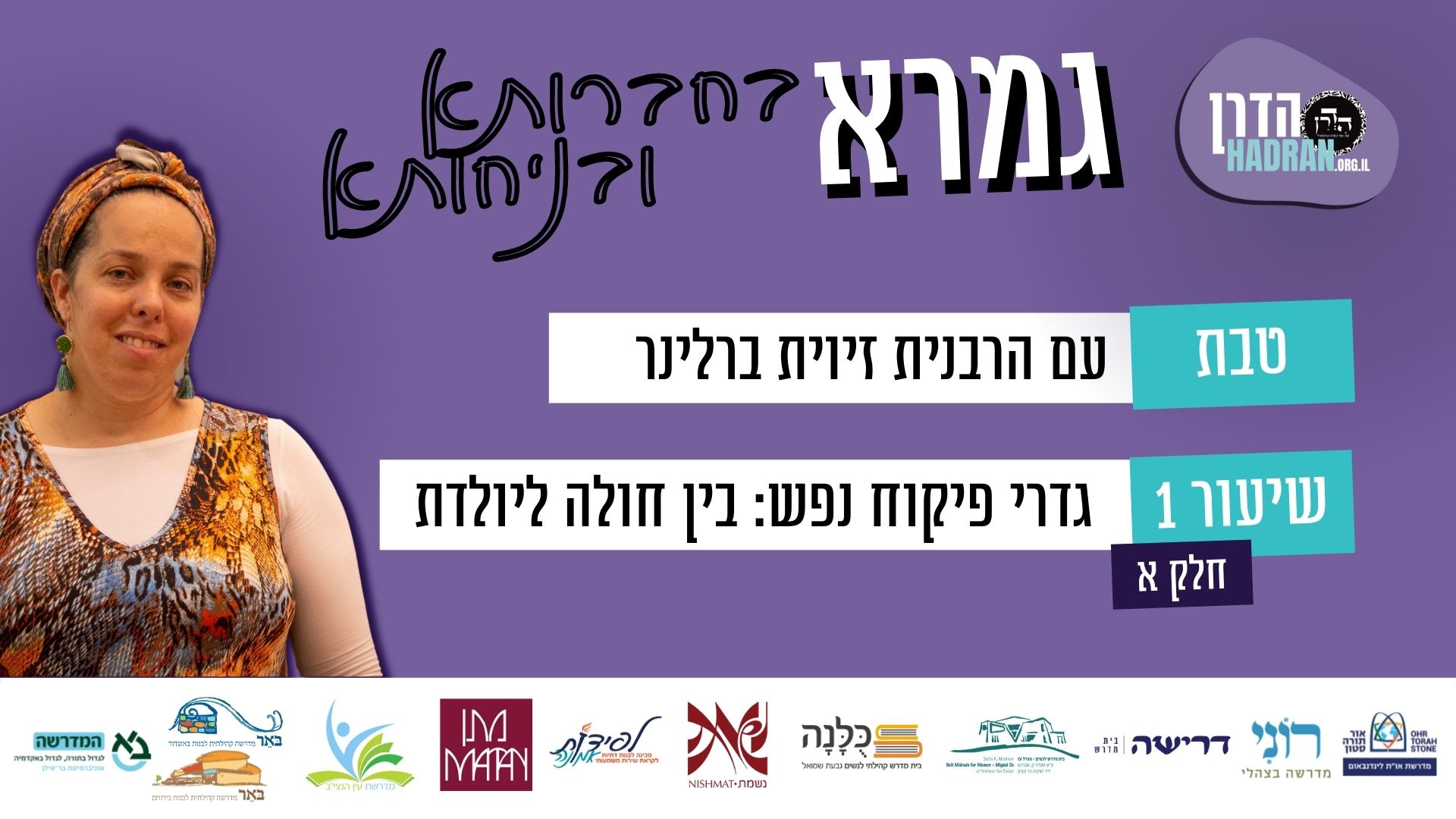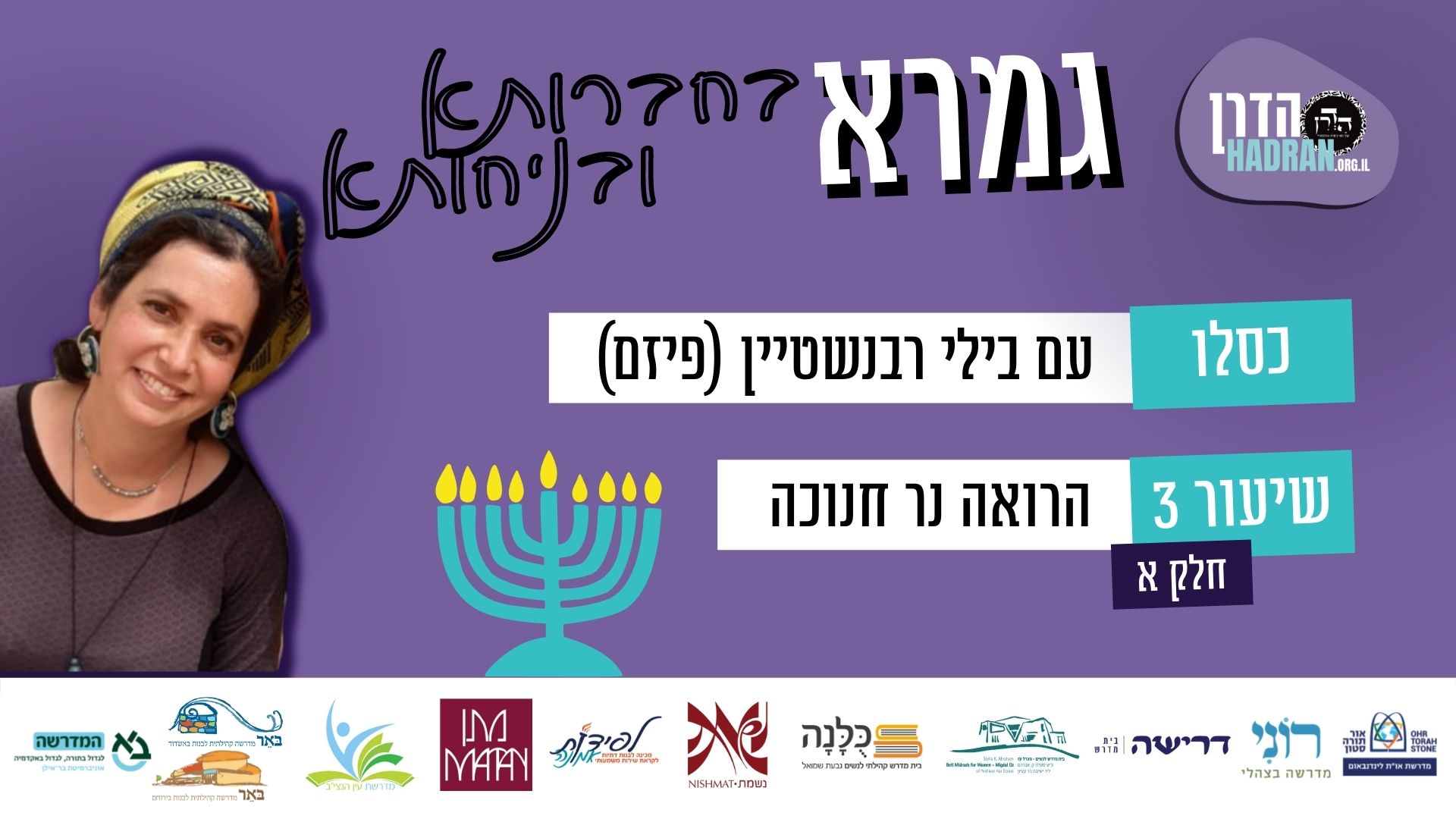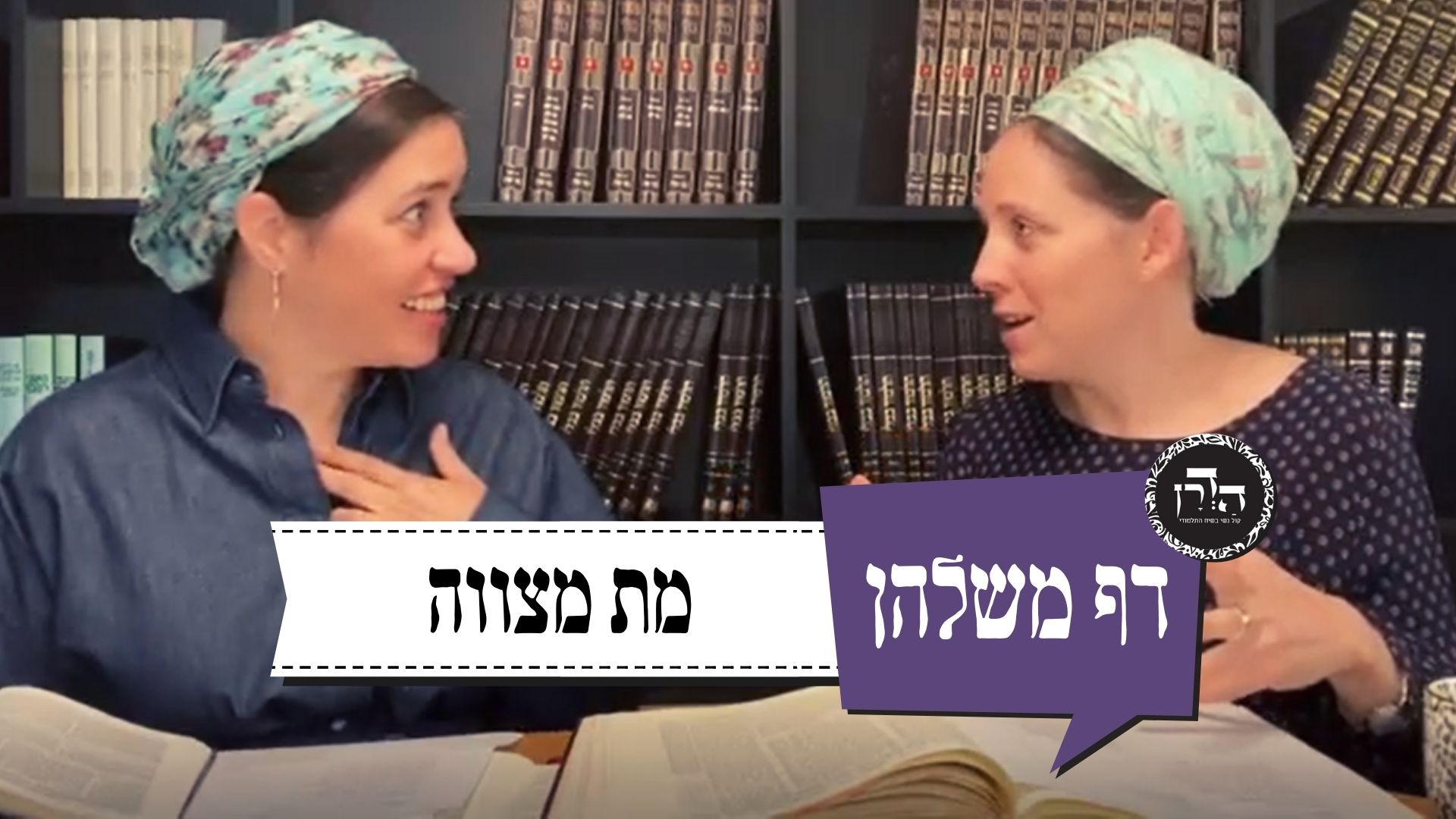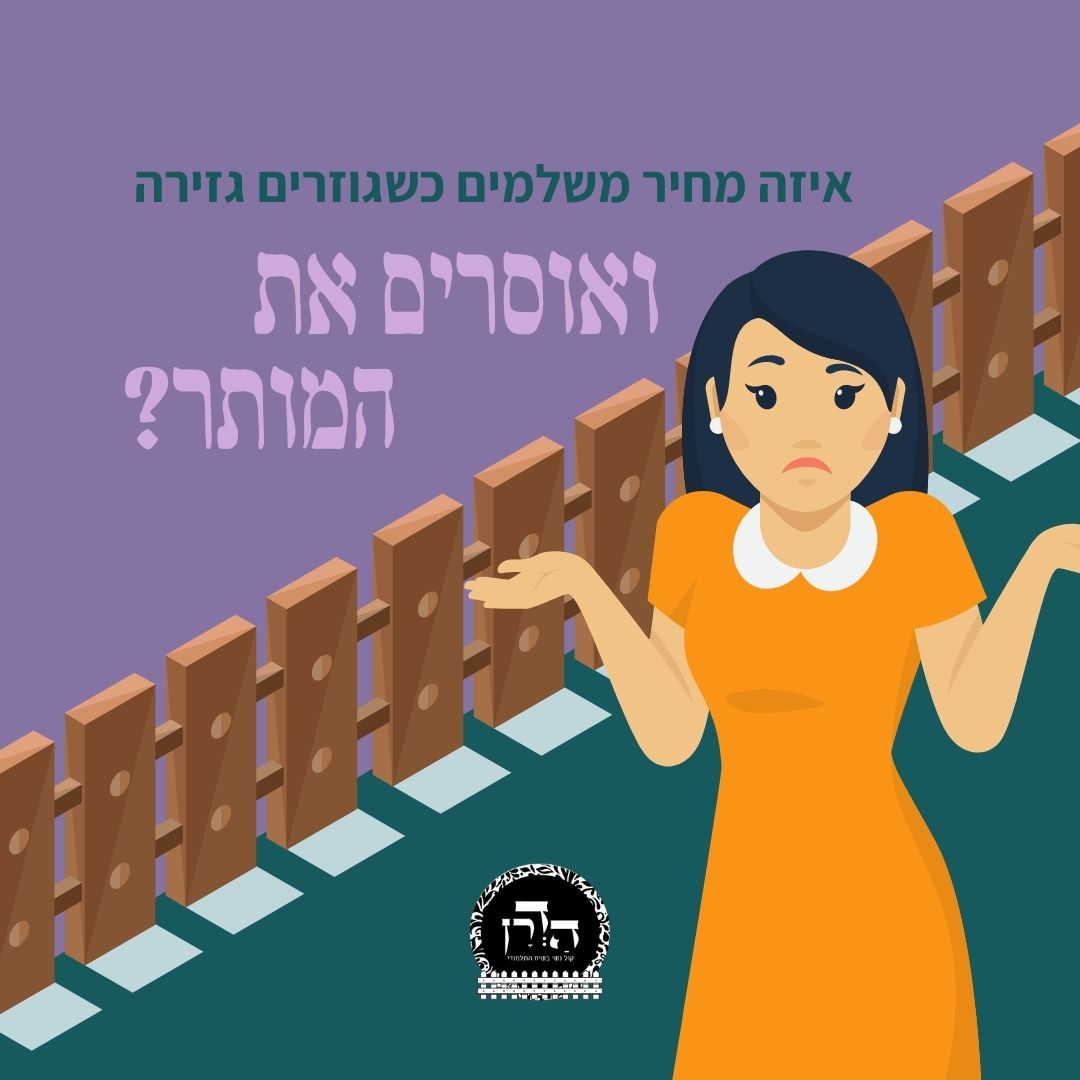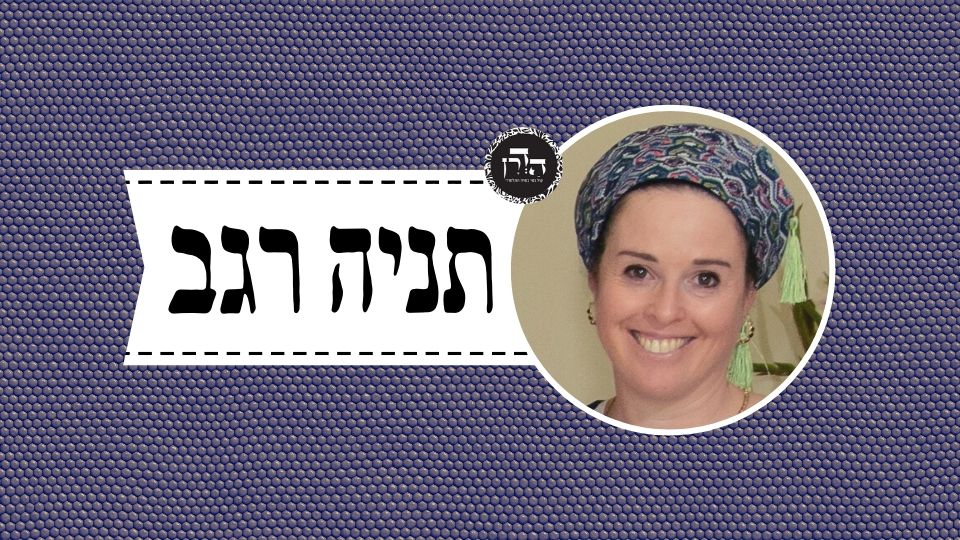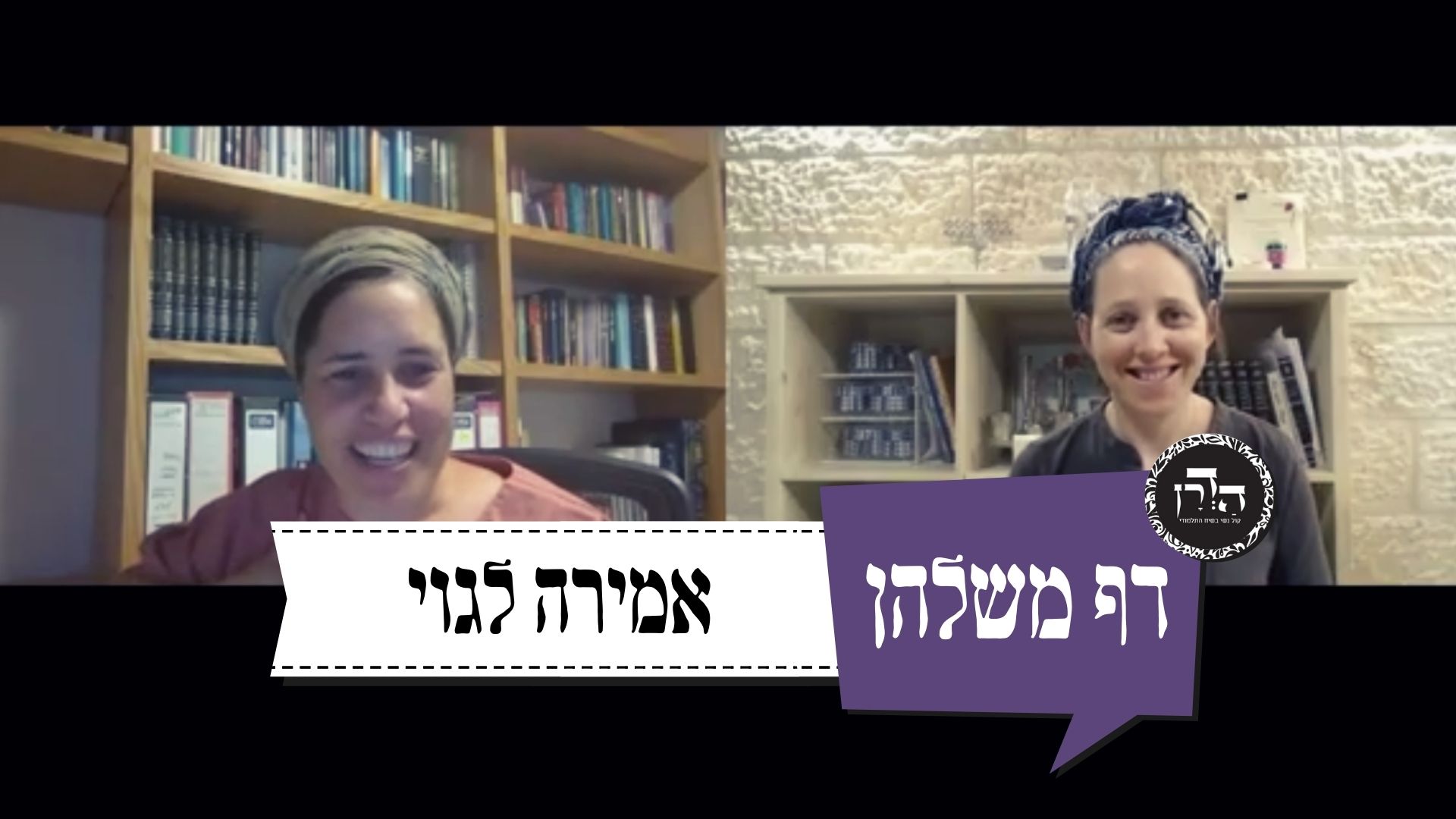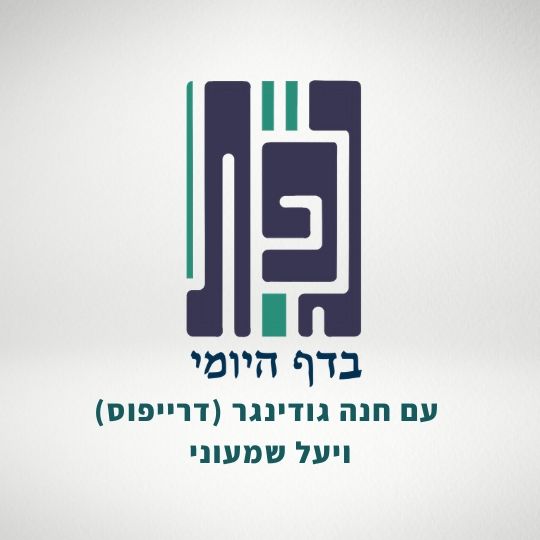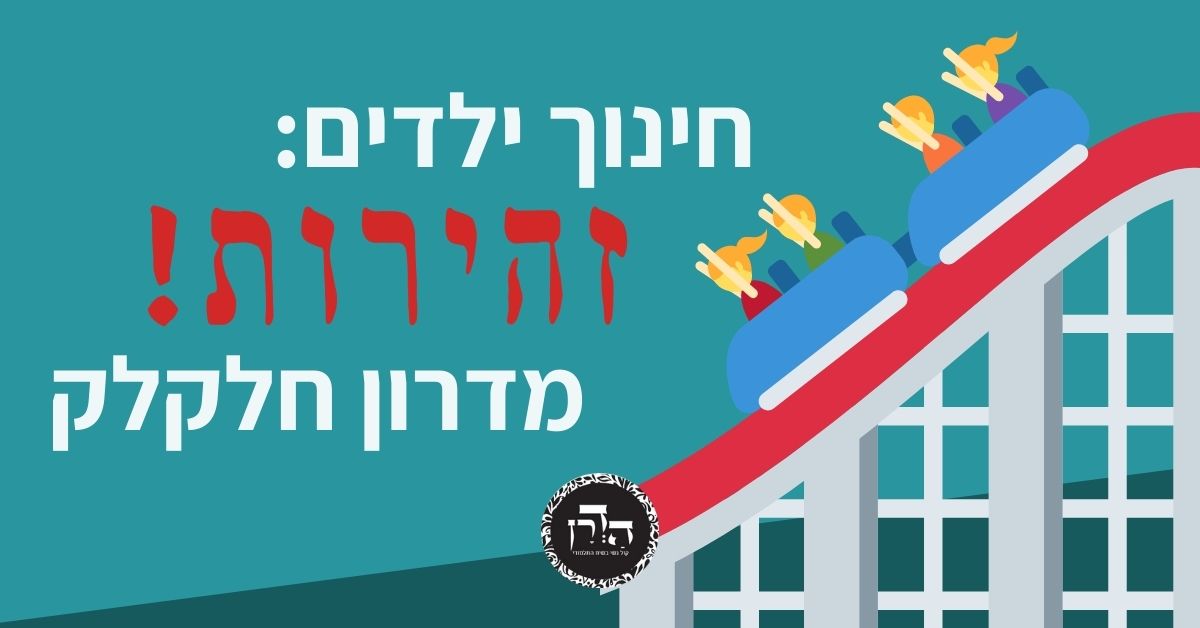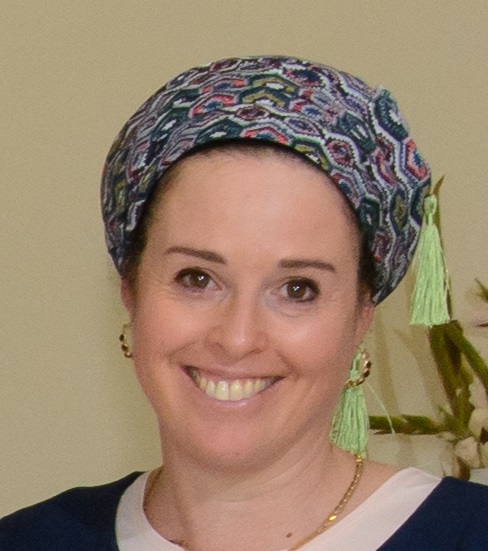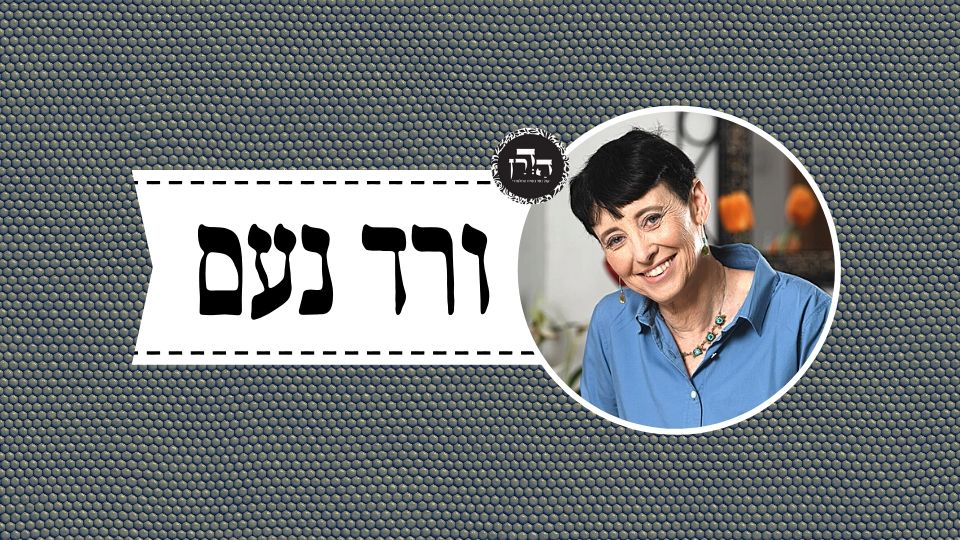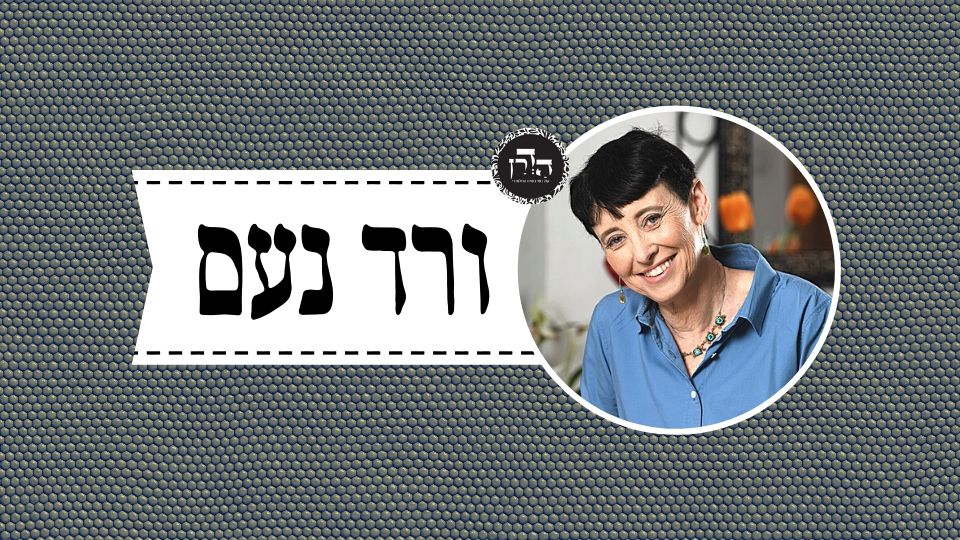שבת קטז
שֶׁאֵין זֶה מְקוֹמָהּ. רַבִּי אוֹמֵר: לֹא מִן הַשֵּׁם הוּא זֶה, אֶלָּא מִפְּנֵי שֶׁסֵּפֶר חָשׁוּב הוּא בִּפְנֵי עַצְמוֹ.
that this is not its place, as the previous portion does not discuss the nation’s travels. Rabbi Yehuda HaNasi says: It is not for that reason that signs were inserted. Rather, the signs are there because this portion is considered a book unto itself.
כְּמַאן אָזְלָא הָא דְּאָמַר רַבִּי שְׁמוּאֵל בַּר נַחְמָן אָמַר רַבִּי יוֹנָתָן: ״חָצְבָה עַמּוּדֶיהָ שִׁבְעָה״, אֵלּוּ שִׁבְעָה סִפְרֵי תוֹרָה? — כְּמַאן כְּרַבִּי.
The Gemara asks: According to whose opinion is that which Rabbi Shmuel bar Naḥman said that Rabbi Yonatan said, that with regard to the verse: “With wisdom she built her house, she carved its seven pillars” (Proverbs 9:1), these are the seven books of the Torah? According to whose opinion? It is according to the opinion of Rabbi Yehuda HaNasi, as by his count there are seven books of the Torah: Genesis; Exodus; Leviticus; Numbers until: “And when the Ark traveled”; the portion: “And when the Ark traveled,” which is considered its own book; the remainder of Numbers; and Deuteronomy.
מַאן תַּנָּא דִּפְלִיג עֲלֵיהּ דְּרַבִּי — רַבָּן שִׁמְעוֹן בֶּן גַּמְלִיאֵל הוּא. דְּתַנְיָא: רַבָּן שִׁמְעוֹן בֶּן גַּמְלִיאֵל אוֹמֵר: עֲתִידָה פָּרָשָׁה זוֹ שֶׁתֵּיעָקֵר מִכָּאן וְתִכָּתֵב בִּמְקוֹמָהּ. וְלָמָּה כְּתָבָהּ כָּאן — כְּדֵי לְהַפְסִיק בֵּין פּוּרְעָנוּת רִאשׁוֹנָה לְפוּרְעָנוּת שְׁנִיָּיה. פּוּרְעָנוּת שְׁנִיָּיה מַאי הִיא — ״וַיְהִי הָעָם כְּמִתְאוֹנְנִים״. פּוּרְעָנוּת רִאשׁוֹנָה — ״וַיִּסְעוּ מֵהַר ה׳״, וְאָמַר רַבִּי חָמָא בְּרַבִּי חֲנִינָא: שֶׁסָּרוּ מֵאַחֲרֵי ה׳. וְהֵיכָן מְקוֹמָהּ? אָמַר רַב אָשֵׁי: בַּדְּגָלִים.
Who is the tanna who disagrees with Rabbi Yehuda HaNasi? It is Rabban Shimon ben Gamliel. As it was taught in a baraita that Rabban Shimon ben Gamliel says: In the future, this portion will be uprooted from here, where it appears, and will be written in its proper place. And why was it written here, even though it discusses the travels of the children of Israel, and the portion before it does not? It is in order to demarcate between the first punishment and the second punishment. What is the second punishment that appears immediately afterward? It is the verse: “And the people complained wickedly in God’s ears, and God heard and became angry, and the fire of God burned in them and it consumed the edge of the camp” (Numbers 11:1). What is the first punishment? It is the verse: “And they traveled from the mountain of God [mehar Hashem] for three days” (Numbers 10:33), and Rabbi Ḥama, son of Rabbi Ḥanina, said: That they turned from after God [me’aḥarei Hashem] and hurriedly fled Mount Sinai. The Gemara asks: And if so, where is the proper place for this paragraph? Rav Ashi said: In the portion of the flags, where there is a description of the manner in which the Jewish people traveled through the desert.
אִיבַּעְיָא לְהוּ: הַגִּלְיוֹנִין שֶׁל סֵפֶר תּוֹרָה, מַצִּילִין אוֹתָן מִפְּנֵי הַדְּלֵיקָה אוֹ אֵין מַצִּילִין אוֹתָן מִפְּנֵי הַדְּלֵיקָה? תָּא שְׁמַע: סֵפֶר תּוֹרָה שֶׁבָּלָה, אִם יֵשׁ בּוֹ לְלַקֵּט שְׁמוֹנִים וְחָמֵשׁ אוֹתִיּוֹת, כְּגוֹן פָּרָשַׁת ״וַיְהִי בִּנְסוֹעַ הָאָרוֹן״ — מַצִּילִין, וְאִם לָאו אֵין מַצִּילִין. וְאַמַּאי, תִּיפּוֹק לֵיהּ מִשּׁוּם גִּילָּיוֹן דִּידֵיהּ! בָּלָה שָׁאנֵי.
A dilemma was raised before the Sages: With regard to the blank folios of parchment of a Torah scroll, does one rescue them from the fire on Shabbat, or does one not rescue them from the fire? Come and hear a resolution to this from that which we learned: With regard to a Torah scroll that is worn, if there is enough in it to compile eighty-five complete letters as in the portion of: “And when the Ark traveled,” one rescues it from the fire, and if not one does not rescue it. If even the blank folios are rescued, why would one not rescue a Torah scroll with fewer than the requisite number of letters? Derive that this scroll may be rescued due to its blank folios. The Gemara answers: A Torah scroll that is worn is different, because at that point its sanctity is negated, and its blank folios are not sacred. Therefore, one may rescue the scroll only if it contains eighty-five letters.
תָּא שְׁמַע: סֵפֶר תּוֹרָה שֶׁנִּמְחַק, אִם יֵשׁ בּוֹ לְלַקֵּט שְׁמוֹנִים וְחָמֵשׁ אוֹתִיּוֹת, כְּגוֹן פָּרָשַׁת ״וַיְהִי בִּנְסוֹעַ הָאָרוֹן״ — מַצִּילִין, וְאִם לָאו — אֵין מַצִּילִין, וְאַמַּאי? תִּיפּוֹק לֵיהּ מִשּׁוּם גִּילָּיוֹן דִּידֵיהּ! מְקוֹם הַכְּתָב לָא קָמִיבַּעְיָא לִי, דְּכִי קָדוֹשׁ — אַגַּב כְּתָב הוּא דְּקָדוֹשׁ, אֲזַל כְּתָב — אֲזַלָא לַהּ קְדוּשְׁתֵּיהּ. כִּי קָמִיבַּעְיָא לִי שֶׁל מַעְלָה וְשֶׁל מַטָּה, שֶׁבֵּין פָּרָשָׁה לְפָרָשָׁה, שֶׁבֵּין דַּף לְדַף, שֶׁבִּתְחִלַּת הַסֵּפֶר, שֶׁבְּסוֹף הַסֵּפֶר. וְתִיפּוֹק לֵיהּ מִשּׁוּם הַהוּא! דְּגִיז וּשְׁדֵי.
Come and hear a different resolution from that which was taught in another baraita: With regard to a Torah scroll that was erased, if there is enough in it to compile eighty-five complete letters as in the portion of: “And when the Ark traveled,” one rescues it from the fire, and if not, one does not rescue it. And why is that so? Derive that this scroll may be rescued due to its blank folios, as the erased section is surely no less significant than the blank folios of the scroll. The Gemara answers: That is not so. In a case where the place of the writing is erased it is not a dilemma for me, as it is sacred due to the writing. If the writing is gone, its sanctity is gone. When it is a dilemma for me is with regard to the blank portions that are above and below, that are between one section and another section, that are between one page and another page, that are at the beginning of the scroll, and that are at the end of the scroll. The Gemara asks again: Derive that this scroll may be rescued due to that area that is blank, whose sanctity remains. The Gemara replies: There, it is referring to a case where the blank area was cut and thrown out, and all that remains is the place of the writing.
תָּא שְׁמַע: הַגִּלְיוֹנִין שֶׁל מַעְלָה וְשֶׁל מַטָּה, שֶׁבֵּין פָּרָשָׁה לְפָרָשָׁה, שֶׁבֵּין דַּף לְדַף, שֶׁבִּתְחִלַּת הַסֵּפֶר, שֶׁבְּסוֹף הַסֵּפֶר — מְטַמְּאִין אֶת הַיָּדַיִם! דִילְמָא אַגַּב סֵפֶר תּוֹרָה שָׁאנֵי.
Come and hear a different resolution from what we learned in a mishna: The Sages decreed that the blank folios that are above and below, that are between one section and another section, that are between one page and another page, that are at the beginning of the scroll, and that are at the end of the scroll render the hands that touch them ritually impure. Apparently, the blank folios have the sanctity of a Torah scroll. The Gemara replies: That is not a proof, as perhaps when it is part of the Torah scroll, it is different, and in those circumstances the sanctity of the Torah extends to the blank portions. When they stand alone they have no sanctity.
תָּא שְׁמַע: הַגִּילְיוֹנִין וְסִפְרֵי מִינִין אֵין מַצִּילִין אוֹתָן מִפְּנֵי הַדְּלֵיקָה, אֶלָּא נִשְׂרָפִין בִּמְקוֹמָן הֵן וְאַזְכָּרוֹתֵיהֶן. מַאי לָאו, גִּלְיוֹנִין דְּסֵפֶר תּוֹרָה? לָא, גִּלְיוֹנִין דְּסִפְרֵי מִינִין. הַשְׁתָּא סִפְרֵי מִינִין גּוּפַיְיהוּ אֵין מַצִּילִין, גִּלְיוֹנִין מִבַּעְיָא? הָכִי קָאָמַר: וְסִפְרֵי מִינִין הֲרֵי הֵן כְּגִלְיוֹנִים.
Therefore, come and hear a different resolution from that which was taught in another baraita: With regard to the blank folios and the Torah scrolls of heretics, one does not rescue them from the fire; rather, they burn in their place, they and the names of God contained therein. What, is this not referring to the blank folios of a Torah scroll? The Gemara rejects this: No, it is referring to the blank folios of the scrolls of heretics. The Gemara is surprised at this: Now, with regard to the scrolls of heretics themselves, one does not rescue them; is it necessary to say that one does not rescue their blank folios? Rather, this is what it is saying: And the scrolls of heretics are like blank folios.
גּוּפַהּ: הַגִּלְיוֹנִים וְסִפְרֵי מִינִין אֵין מַצִּילִין אוֹתָם מִפְּנֵי הַדְּלֵיקָה. רַבִּי יוֹסֵי אוֹמֵר: בַּחוֹל קוֹדֵר אֶת הָאַזְכָּרוֹת שֶׁבָּהֶן וְגוֹנְזָן, וְהַשְּׁאָר — שׂוֹרְפָן. אָמַר רַבִּי טַרְפוֹן: אֲקַפֵּחַ אֶת בָּנַי, שֶׁאִם יָבֹאוּ לְיָדִי שֶׁאֲנִי אֶשְׂרוֹף אוֹתָם וְאֶת הָאַזְכָּרוֹת שֶׁבָּהֶן. שֶׁאֲפִילּוּ אָדָם רוֹדֵף אַחֲרָיו לְהוֹרְגוֹ, וְנָחָשׁ רָץ לְהַכִּישׁוֹ, נִכְנָס לְבֵית עֲבוֹדָה זָרָה וְאֵין נִכְנָס לְבָתֵּיהֶן שֶׁל אֵלּוּ, שֶׁהַלָּלוּ מַכִּירִין וְכוֹפְרִין, וְהַלָּלוּ אֵין מַכִּירִין וְכוֹפְרִין. וַעֲלֵיהֶן הַכָּתוּב אוֹמֵר: ״אַחַר הַדֶּלֶת וְהַמְּזוּזָה שַׂמְתְּ זִכְרוֹנֵךְ״.
Apropos the scrolls of heretics, the Gemara analyzes the matter itself. With regard to the blank folios and the Torah scrolls of the heretics, one does not rescue them from the fire. Rabbi Yosei says: During the week, one cuts the names of God contained therein and buries them, and burns the rest. Rabbi Tarfon said in the form of an oath: I will bury my sons if I fail to do the following, that if these books come into my possession I will burn them and the names contained therein. As even if a person is pursuing him with the intent to kill him, and a snake is hurrying to bite him, one enters a house of idolatry and does not enter the houses of these heretics. The reason is that these heretics are aware of the greatness of the Creator manifest in the Torah and its mitzvot, and nevertheless, they deny the existence of God; whereas these idolators are not aware, and that is the reason that they deny the existence of God. And with regard to the heretics, the verse says: “And behind the door and the doorpost you place your memory” (Isaiah 57:8). Although they remember the word of God, they treat it contemptuously, as if casting it behind the door.
אָמַר רַבִּי יִשְׁמָעֵאל, קַל וָחוֹמֶר: וּמָה לַעֲשׂוֹת שָׁלוֹם בֵּין אִישׁ לְאִשְׁתּוֹ אָמְרָה תּוֹרָה: שְׁמִי שֶׁנִּכְתַּב בִּקְדוּשָּׁה יִמָּחֶה עַל הַמַּיִם, הַלָּלוּ שֶׁמְּטִילִין קִנְאָה וְאֵיבָה וְתַחֲרוּת בֵּין יִשְׂרָאֵל לַאֲבִיהֶן שֶׁבַּשָּׁמַיִם — עַל אַחַת כַּמָּה וְכַמָּה. וַעֲלֵיהֶם אָמַר דָּוִד: ״הֲלֹא מְשַׂנְאֶיךָ ה׳ אֶשְׂנָא וּבִתְקוֹמְמֶיךָ אֶתְקוֹטָט תַּכְלִית שִׂנְאָה שְׂנֵאתִים לְאוֹיְבִים הָיוּ לִי״. וּכְשֵׁם שֶׁאֵין מַצִּילִין אוֹתָן מִפְּנֵי הַדְּלֵיקָה, כָּךְ אֵין מַצִּילִין אוֹתָן לֹא מִן הַמַּפּוֹלֶת וְלֹא מִן הַמַּיִם וְלֹא מִדָּבָר הַמְאַבְּדָן.
Rabbi Yishmael said: The fact that the names of God in the scrolls of heretics may be burned can be derived through an a fortiori inference: Just as to make peace between a husband and his wife, the Torah says: My name that was written in sanctity shall be erased in the water in the framework of the ordeal of the sota; these, the heretics, who impose jealousy, and hatred, and conflict between the Jewish people and their Father in Heaven, all the more so it is proper to erase God’s names because of them. And with regard to heretics, David said: “For I hate those who hate You, God, and I fight those who rise against You. I hate them with the utmost hatred, they have become enemies to me” (Psalms 139:21–22). And just as they, the scrolls of heretics, are not rescued from the fire, neither are they rescued from a rockslide, nor from water, nor from any other matter that destroys them.
בָּעֵי מִינֵּיהּ יוֹסֵף בַּר חָנִין מֵרַבִּי אֲבָהוּ: הָנֵי סִפְרֵי דְבֵי אֲבִידָן, מַצִּילִין אוֹתָן מִפְּנֵי הַדְּלֵיקָה אוֹ אֵין מַצִּילִין? אִין וְלָאו וְרַפְיָא בִּידֵיהּ. רַב לָא אָזֵיל לְבֵי אֲבִידָן, וְכׇל שֶׁכֵּן לְבֵי נִצְרְפֵי. שְׁמוּאֵל לְבֵי נִצְרְפֵי לָא אָזֵיל, לְבֵי אֲבִידָן אָזֵיל. אֲמַרוּ לֵיהּ לְרָבָא: מַאי טַעְמָא לָא אָתֵית לְבֵי אֲבִידָן? אֲמַר לְהוּ: דִּיקְלָא פְּלָנְיָא אִיכָּא בְּאוֹרְחָא, וְקָשֵׁי לִי. נִיעְקְרֵיהּ. דּוּכְתֵּיהּ קָשֵׁי לִי. מָר בַּר יוֹסֵף אָמַר: אֲנָא מִינַּיְיהוּ אֲנָא, וְלָא מִסְתְּפֵינָא מִינַּיְיהוּ. זִימְנָא חֲדָא אֲזַל, בְּעוֹ לְסַכּוֹנֵיהּ. רַבִּי מֵאִיר הֲוָה קָרֵי לֵיהּ ״אָוֶון גִּלְיוֹן״. רַבִּי יוֹחָנָן הֲוָה קָרֵי לֵיהּ ״עֲווֹן גִּלְיוֹן״.
Yosef bar Ḥanin raised a dilemma before Rabbi Abbahu: With regard to these books of the house of Abidan, does one rescue them from the fire or does one not rescue them? There were sacred Jewish texts in that house, which were used in debates and discussions on matters of faith. Rabbi Abbahu did not give him a clear answer but said yes and no, and the matter was uncertain to him. Rav would not go to the house of Abidan for conversation, and all the more so he would not go to the house of Nitzrefei, the Persian fire-temple. Shmuel, to the house of Nitzrefei he did not go, but to the house of Abidan he did go. The gentile scholars said to Rava: Why did you not come to the house of Abidan? He evaded their question with an excuse and said to them: There is a certain palm tree on the road, and that makes the path difficult for me. They said to him: We will uproot it. He said to them: Nevertheless, the resulting pit in its place will be difficult for me. Mar bar Yosef said: I am one of them, we are friends, and I do not fear them. Still, one time he went and argued with them and they sought to endanger his life. Rabbi Meir would call the Christian writing, the Evangelion, the wicked folio [aven gilyon]; Rabbi Yoḥanan called it the sinful folio [avon gilyon].
אִימָּא שָׁלוֹם, דְּבֵיתְהוּ דְּרַבִּי אֱלִיעֶזֶר, אֲחָתֵיהּ דְּרַבָּן גַּמְלִיאֵל הֲוַאי. הֲוָה הָהוּא פִילוֹסְפָא בְּשִׁבָבוּתֵיהּ
The Gemara relates: Imma Shalom, the wife of Rabbi Eliezer, was Rabban Gamliel’s sister. There was a Christian philosopher [pilosofa] in their neighborhood
דַּהֲוָה שְׁקִיל שְׁמָא דְּלָא מְקַבֵּל שׁוּחְדָּא. בְּעוֹ לְאַחוֹכֵי בֵּיהּ. עַיַּילָא לֵיהּ שְׁרָגָא דְּדַהֲבָא, וַאֲזוּל לְקַמֵּיהּ. אֲמַרָה לֵיהּ: בָּעֵינָא דְּנִיפְלְגוּ לִי בְּנִכְסֵי דְּבֵי נָשַׁי. אֲמַר לְהוּ: פְּלוּגוּ. אֲמַר לֵיהּ, כְּתִיב לַן: בִּמְקוֹם בְּרָא, בְּרַתָּא לָא תֵּירוֹת. אֲמַר לֵיהּ: מִן יוֹמָא דִּגְלִיתוּן מֵאַרְעֲכוֹן, אִיתְנְטִילַת אוֹרָיְיתָא דְּמֹשֶׁה וְאִיתִיְהִיבַת עֲווֹן גִּלְיוֹן, וּכְתִיב בֵּיהּ: בְּרָא וּבְרַתָּא כַּחֲדָא יִרְתוּן.
who disseminated about himself the reputation that he does not accept bribes. They wanted to mock him and reveal his true nature. She privately gave him a golden lamp, and she and her brother came before him, approaching him as if they were seeking judgment. She said to the philosopher: I want to share in the inheritance of my father’s estate. He said to them: Divide it. Rabban Gamliel said to him: It is written in our Torah: In a situation where there is a son, the daughter does not inherit. The philosopher said to him: Since the day you were exiled from your land, the Torah of Moses was taken away and the avon gilyon was given in its place. It is written in the avon gilyon: A son and a daughter shall inherit alike.
לְמָחָר הֲדַר עַיֵּיל לֵיהּ אִיהוּ חֲמָרָא לוּבָא. אֲמַר לְהוּ: שְׁפִילִית לְסֵיפֵיהּ דַּעֲווֹן גִּלְיוֹן, וּכְתִיב בֵּיהּ: אֲנָא לָא לְמִיפְחַת מִן אוֹרָיְיתָא דְּמֹשֶׁה אֲתֵיתִי [וְלָא] לְאוֹסֹפֵי עַל אוֹרָיְיתָא דְמֹשֶׁה אֲתֵיתִי, וּכְתִיב בֵּיהּ: בִּמְקוֹם בְּרָא — בְּרַתָּא לָא תֵּירוֹת. אֲמַרָה לֵיהּ: נְהוֹר נְהוֹרָיךְ כִּשְׁרָגָא. אֲמַר לֵיהּ רַבָּן גַּמְלִיאֵל: אֲתָא חַמְרָא וּבְטַשׁ לִשְׁרָגָא.
The next day Rabban Gamliel brought the philosopher a Libyan donkey. Afterward, Rabban Gamliel and his sister came before the philosopher for a judgment. He said to them: I proceeded to the end of the avon gilayon, and it is written: I, avon gilayon, did not come to subtract from the Torah of Moses, and I did not come to add to the Torah of Moses. And it is written there: In a situation where there is a son, the daughter does not inherit. She said to him: May your light shine like a lamp, alluding to the lamp she had given him. Rabban Gamliel said to him: The donkey came and kicked the lamp, thereby revealing the entire episode.
וּמִפְּנֵי מָה אֵין קוֹרִין כּוּ׳. אָמַר רַב: לֹא שָׁנוּ אֶלָּא בִּזְמַן בֵּית הַמִּדְרָשׁ, אֲבָל שֶׁלֹּא בִּזְמַן בֵּית הַמִּדְרָשׁ — קוֹרִין. וּשְׁמוּאֵל אָמַר: אֲפִילּוּ שֶׁלֹּא בִּזְמַן בֵּית הַמִּדְרָשׁ אֵין קוֹרִין. אִינִי?! וְהָא נְהַרְדְּעָא אַתְרֵיהּ דִּשְׁמוּאֵל הֲוָה, וּבִנְהַרְדְּעָא פָּסְקִי סִידְרָא בִּכְתוּבִים בְּמִנְחֲתָא דְשַׁבְּתָא. אֶלָּא אִי אִיתְּמַר, הָכִי אִיתְּמַר — אָמַר רַב: לֹא שָׁנוּ אֶלָּא בִּמְקוֹם בֵּית הַמִּדְרָשׁ. אֲבָל שֶׁלֹּא בִּמְקוֹם בֵּית הַמִּדְרָשׁ — קוֹרִין.
We learned in the mishna: And why does one not read the Writings on Shabbat? Due to suspension of Torah study in the study hall. Rav said: They only taught that it is prohibited to read from the Writings on Shabbat during the hours of study in the study hall; but when it is not during the hours of study in the study hall, one may read them. And Shmuel said: Even when it is not the hours of study in the study hall one may not read from the Writings on Shabbat. The Gemara asks: Is that so? Wasn’t Neharde’a Shmuel’s place where he was the rabbi of the town, and in Neharde’a they concluded their regular weekly discourse with Writings on Shabbat afternoon. Rather, if a dispute was stated in this matter, it was stated as follows: Rav said: It was only taught that there is a prohibition in a place where there is a study hall nearby that people can attend; but not in a place where there is a study hall, one may read Writings.
וּשְׁמוּאֵל אָמַר: בֵּין בִּמְקוֹם בֵּית הַמִּדְרָשׁ בֵּין שֶׁלֹּא בִּמְקוֹם בֵּית הַמִּדְרָשׁ, בִּזְמַן בֵּית הַמִּדְרָשׁ — אֵין קוֹרִין, שֶׁלֹּא בִּזְמַן בֵּית הַמִּדְרָשׁ — קוֹרִין. וְאַזְדָּא שְׁמוּאֵל לְטַעְמֵיהּ, דְּבִנְהַרְדְּעָא פָּסְקִי סִידְרָא דִכְתוּבִים בְּמִנְחֲתָא דְשַׁבְּתָא.
And Shmuel said: Whether it is in the place of the study hall or it is not the place of the study hall, one may not read anywhere when it is during the hours of study in the study hall; but when it is not during the hours of study in the study hall, one may read. And Shmuel follows his line of reasoning stated elsewhere, as in Neharde’a they would conclude their studies with Writings on Shabbat afternoon.
רַב אָשֵׁי אָמַר: לְעוֹלָם כְּדַאֲמַרַן מֵעִיקָּרָא, וּשְׁמוּאֵל כְּרַבִּי נְחֶמְיָה. דְּתַנְיָא: אַף עַל פִּי שֶׁאָמְרוּ כִּתְבֵי הַקֹּדֶשׁ אֵין קוֹרִין בָּהֶן — אֲבָל שׁוֹנִין בָּהֶן וְדוֹרְשִׁין בָּהֶן. נִצְרַךְ לְפָסוּק — מֵבִיא וְרוֹאֶה בּוֹ. אָמַר רַבִּי נְחֶמְיָה: מִפְּנֵי מָה אָמְרוּ כִּתְבֵי הַקֹּדֶשׁ אֵין קוֹרִין בָּהֶן — כְּדֵי שֶׁיֹּאמְרוּ: בְּכִתְבֵי הַקֹּדֶשׁ אֵין קוֹרִין, וְכׇל שֶׁכֵּן בְּשִׁטְרֵי הֶדְיוֹטוֹת.
Rav Ashi said: Actually, the dispute is as we stated initially, and Shmuel said what he said in accordance with the opinion of Rabbi Neḥemya. As it was taught in a baraita: Although the Sages said with regard to sacred writings that they may not be read on Shabbat, one may study the midrash on them and teach them before the congregation; if one requires a verse that is written in the Writings, he brings a book and looks in it. Rabbi Neḥemya said: Why did they say that sacred writings are not read on Shabbat? So that people will say: Sacred writings may not be read, all the more so that is the case with ordinary documents, i.e., contracts and letters. If so, according to Rabbi Neḥemya, reading any sacred writings on Shabbat is prohibited so that people will refrain from reading non-sacred documents on Shabbat. It was not prohibited to encourage attendance the study hall. Shmuel himself does not hold in accordance with the opinion of Rabbi Neḥemya.
מַתְנִי׳ מַצִּילִין תִּיק הַסֵּפֶר עִם הַסֵּפֶר, וְתִיק הַתְּפִילִּין עִם הַתְּפִילִּין, וְאַף עַל פִּי שֶׁיֵּשׁ בְּתוֹכָן מָעוֹת. וּלְהֵיכָן מַצִּילִין אוֹתָן — לְמָבוֹי שֶׁאֵינוֹ מְפוּלָּשׁ. בֶּן בְּתֵירָא אוֹמֵר: אַף לִמְפוּלָּשׁ.
MISHNA: One may rescue the casing of a Torah scroll from a fire on Shabbat together with the Torah scroll, and the casing of phylacteries along with the phylacteries, even if they have money inside them. And to where may one rescue them? Into an alley that is closed, which, if it is surrounded on three sides, is considered to be a private domain by Torah law. Ben Beteira says: Even into an open alley.
גְּמָ׳ תָּנוּ רַבָּנַן: אַרְבָּעָה עָשָׂר שֶׁחָל לִהְיוֹת בְּשַׁבָּת, מַפְשִׁיטִין אֶת הַפֶּסַח עַד הֶחָזֶה — דִּבְרֵי רַבִּי יִשְׁמָעֵאל בְּנוֹ שֶׁל רַבִּי יוֹחָנָן בֶּן בְּרוֹקָה. וַחֲכָמִים אוֹמְרִים: מַפְשִׁיטִין אֶת כּוּלּוֹ. בִּשְׁלָמָא לְרַבִּי יִשְׁמָעֵאל בְּנוֹ שֶׁל רַבִּי יוֹחָנָן בֶּן בְּרוֹקָה, דְּהָא אִיתְעֲבִיד לֵיהּ צוֹרֶךְ גָּבוֹהַּ. אֶלָּא לְרַבָּנַן מַאי טַעְמָא? אָמַר רַבָּה בַּר בַּר חָנָה אָמַר רַבִּי יוֹחָנָן, דְּאָמַר קְרָא: ״כֹּל פָּעַל ה׳ לַמַּעֲנֵהוּ״. וְהָכָא, מַאי ״לְמַעֲנֵהוּ״ אִיכָּא? רַב יוֹסֵף אָמַר: שֶׁלֹּא יַסְרִיחַ. רָבָא אָמַר: שֶׁלֹּא יְהוּ קׇדְשֵׁי שָׁמַיִם מוּטָלִין כִּנְבֵלָה.
GEMARA: Apropos the mishna, the Gemara cites that which the Sages taught in a baraita: If the fourteenth of Nissan occurs on Shabbat, and the Paschal lamb is offered but not roasted until Shabbat ends, one flays the Paschal lamb up to the breast to enable removal of the parts of the animal that are offered on the altar on Shabbat. One flays the rest of the animal after Shabbat. Further skinning is only to facilitate eating the animal, therefore, it does not override Shabbat; this is the statement of Rabbi Yishmael, son of Rabbi Yoḥanan ben Beroka. And the Rabbis say: One flays it in its entirety. The Gemara asks: Granted, according to the opinion of Rabbi Yishmael, son of Rabbi Yoḥanan ben Beroka, who said one may flay only part of the animal, the halakha is understandable. Since it has already been used for its divine purpose of having its blood sprinkled on the altar, the animal no longer should be flayed. But according to the Rabbis, what is the reason for their opinion? Rabba bar bar Ḥana said that Rabbi Yoḥanan said: The verse states, “All that the Lord has made is for His sake” (Proverbs 16:4), meaning that a prohibited action is only permitted if its performance honors God. The Gemara asks: And here, what manifestation of for His sake is there in flaying the remaining hide from the Paschal lamb? Rav Yosef said: The Rabbis permitted removing the entire hide so that the sacrifice will not putrefy. Rava said: The Rabbis permitted removing the entire hide so that the sacred sacrifices will not be left in disgrace like a half-stripped animal carcass left unattended.
מַאי בֵּינַיְיהוּ? אִיכָּא בֵּינַיְיהוּ דְּמַנַּח אַפָּתוּרָא דְּדַהֲבָא, אִי נָמֵי יוֹמָא דְּאִסְתָּנָא. וְרַבִּי יִשְׁמָעֵאל בְּנוֹ שֶׁל רַבִּי יוֹחָנָן בֶּן בְּרוֹקָה, הַאי ״פָּעַל ה׳ לַמַּעֲנֵהוּ״ מַאי עָבֵיד לֵיהּ? שֶׁלֹּא יוֹצִיא אֶת הָאֵימוּרִין קוֹדֶם הַפְשָׁטַת הָעוֹר. מַאי טַעְמָא? אָמַר רַב הוּנָא בְּרֵיהּ דְּרַב נָתָן: מִשּׁוּם נִימִין.
The Gemara asks: What is the practical difference between them? The Gemara answers: There is a practical difference between them when the Paschal lamb is laid on a golden table. In this case, there is indeed a concern that the carcass will putrefy, although there is no element of disgrace. Alternatively, there is a practical difference on a day with a cold northern wind. In this case, there is no concern that it will putrefy but there is a concern of disgracing the sacrifice. The Gemara asks: And what does Rabbi Yishamel, son of Rabbi Yoḥanan ben Beroka, do with the verse, “All that the Lord has made is for His sake”? The Gemara answers: He uses it to permit removing part of the hide, as if it was not for this verse, it would have been possible to remove the sacrificial parts offered on the altar before removing the hide by puncturing the hide of the animal and removing the fats through the opening. The Gemara asks: What is the reason that the Torah prohibited doing so? Rav Huna, son of Rav Natan, said: Because of the hairs, so that they do not become entangled in the sacrificial parts and distort them.
אָמַר רַב חִסְדָּא אָמַר מָר עוּקְבָא: מַאי אַהְדַּרוּ לֵיהּ חַבְרַיָּיא לְרַבִּי יִשְׁמָעֵאל בְּנוֹ שֶׁל רַבִּי יוֹחָנָן בֶּן בְּרוֹקָה? הָכִי קָאָמְרִי לֵיהּ: אִם מַצִּילִין תִּיק הַסֵּפֶר עִם הַסֵּפֶר, לֹא נַפְשִׁיט אֶת הַפֶּסַח מֵעוֹרוֹ? מִי דָּמֵי?! הָתָם — טִלְטוּל, הָכָא — מְלָאכָה! אָמַר רַב אָשֵׁי: בְּתַרְתֵּי פְּלִיגִי, פְּלִיגִי בְּטִלְטוּל וּפְלִיגִי בִּמְלָאכָה, וְהָכִי קָאָמְרִי לֵיהּ: אִם מַצִּילִין תִּיק הַסֵּפֶר עִם הַסֵּפֶר, לֹא נְטַלְטֵל עוֹר אַגַּב בָּשָׂר?!
Rav Ḥisda said that Mar Ukva said: How did the members of the group respond to Rabbi Yishmael, son of Rabbi Yoḥanan ben Beroka? This is what they said to him: If one may save the casing of a Torah scroll along with the Torah scroll, why may one not strip the Paschal lamb of its skin? Here too, in the case of skinning the Paschal lamb, once part of the action is permitted one should be able to perform the entire act. The Gemara is surprised at this: Are they comparable? There, in rescuing the casing of the scroll, only moving is involved, which is prohibited by rabbinic law; whereas here, in the case of the Paschal lamb, the act of flaying is a prohibited labor by Torah law. Rav Ashi said: They are disagreeing with regard to two issues: They disagree with regard to moving the hide along with the flesh, and they disagree with regard to the labor of flaying the animal. And this is what they said to him: If one may rescue the casing of the Torah scroll along with the Torah scroll, will we not move the hide of the Paschal lamb together with the flesh of the sacrifice? The sacrifice should be moved with its skin so it does not putrefy.



